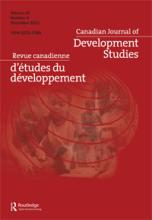Resource information
RÉSUMÉ
Cette recherche propose une réflexion sur l’accès inégal des femmes à la terre au Fuuta dans une perspective d’analyse féministe intersectionnelle et néoinstitutionnelle. L’objectif est d’explorer les raisons qui expliquent pourquoi, malgré l’existence d’un cadre formel garantissant l’accès équitable à la terre, plusieurs femmes du Fuuta (Sénégal) demeurent désavantagées par rapport aux hommes. L’analyse porte principalement sur les relations de pouvoir dans la communauté et les rôles que peuvent jouer les institutions genrées, aussi bien formelles qu’informelles, dans le maintien des pratiques discriminatoires qui limitent l’accès des femmes aux terres agricoles dans cette région.
ABSTRACT
This research offers a reflection on women’s access to land from a perspective of intersectional feminism and neoinstitutional analysis. It seeks to explore the reasons why, despite the existence of a legal framework to ensure equal access to land, many women from the Fuuta (Senegal) are still significantly disadvantaged compared to men. The analysis focuses on power relations within the community and the roles that gendered institutions, both formal and informal, play in maintaining discriminatory practices that limit women’s access to agricultural land in that region.

